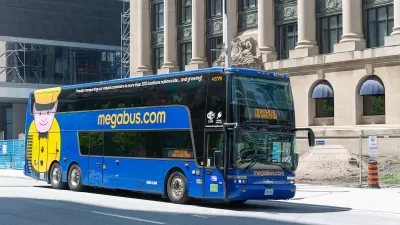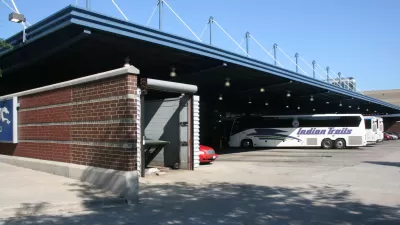Nonprofits often advocate for local transit spending, but when we gather, we seem to forget these values. How would we know what the transit of a given city is like if we never ride their buses?

Last May, I got my first glimpses of Louisville, Kentucky, from the windows of a public bus. As we crossed railroad bridges, passed a campus, and slid between blocks of neat Victorian homes, we learned from the bus driver about how many more jobs there were in Louisville compared to Toledo where she’d come from, and we chatted about the royal wedding. Approaching the hotel on foot from the bus stop two blocks away, I was welcomed by some of downtown Louisville’s ubiquitous street art, including gigantic walk-through bourbon barrel staves, and I got a quick look at the Ohio River before heading inside.
The 30-minute ride cost me $1.75, which for the penny-conscious nonprofit business traveler is a pretty good deal compared to a taxi, ride-hail, or airport shuttle.
I don’t know if I was the only attendee who arrived at that conference from the airport by bus, but I wouldn’t be surprised, given that neither the conference organizers nor the hotel listed it in their transportation from airport options. And they are not alone. In my eight years of attending at least half a dozen conferences a year, the number of conference logistics emails or travel FAQs [frequently-asked questions lists] that I’ve seen include information on bus routes from the airport is small, if indeed there were any.
FULL STORY: Taking the Bus: Nonprofit Conferences and Integrity of Purpose

Maui's Vacation Rental Debate Turns Ugly
Verbal attacks, misinformation campaigns and fistfights plague a high-stakes debate to convert thousands of vacation rentals into long-term housing.

Planetizen Federal Action Tracker
A weekly monitor of how Trump’s orders and actions are impacting planners and planning in America.

In Urban Planning, AI Prompting Could be the New Design Thinking
Creativity has long been key to great urban design. What if we see AI as our new creative partner?

Pedestrian Deaths Drop, Remain Twice as High as in 2009
Fatalities declined by 4 percent in 2024, but the U.S. is still nowhere close to ‘Vision Zero.’

King County Supportive Housing Program Offers Hope for Unhoused Residents
The county is taking a ‘Housing First’ approach that prioritizes getting people into housing, then offering wraparound supportive services.

Researchers Use AI to Get Clearer Picture of US Housing
Analysts are using artificial intelligence to supercharge their research by allowing them to comb through data faster. Though these AI tools can be error prone, they save time and housing researchers are optimistic about the future.
Urban Design for Planners 1: Software Tools
This six-course series explores essential urban design concepts using open source software and equips planners with the tools they need to participate fully in the urban design process.
Planning for Universal Design
Learn the tools for implementing Universal Design in planning regulations.
planning NEXT
Appalachian Highlands Housing Partners
Mpact (founded as Rail~Volution)
City of Camden Redevelopment Agency
City of Astoria
City of Portland
City of Laramie





























